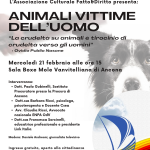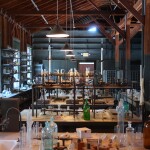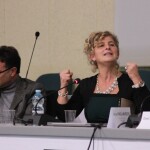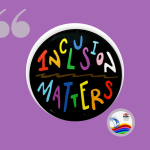
contributo della Dott.ssa MARTA MOGLIE
english version
On Saturday 25 th February, the University of Macerata hosted a conference whose theme was “Disability and Inclusion at school”. Among the speakers, Silvia Diamante, a special needs teacher for secondary school, former classmate of mine since the era of the primary school in 1990s, and member of Orizzonte Autonomia Onlus, a non profit association created by Giulia Fesce, another speaker at this meeting. Moderator of the conference, PhD Francesca Salis, researcher and teacher of Pedagogy of disabilities and special teaching in the training courses of specialized teachers for inclusion, at the Faculty of Educational Science of Cultural Heritage and Tourism. The meeting lasted more than three hours, with the object of stimulating students to think about the possible effective communication between family and school (or eventually, the chance to create a different project).
The common point among these three teachers is not only that of working in the same field, but also that of being mums to special needs kids. It means living fully and completely a life together with disability, diversity and all the aspects which are related to that. Every. Single. Day.
The first aspect which arose during the conference was the so called trap of the forced inclusion: when inclusion doesn’t come naturally in a case of severe disability. As Silvia told us, inclusion is often a double edged sword: the aim is that of not excluding anybody, but it’s difficult to keep in mind the real necessities of a special needs kid.
This case concerns the experience of Giulia Fesce, president of Orizzonte Autonimia Onlus and mum to Andrea, partially sighted kid and with a severe disability. His class went to the cinema to watch a movie about the Shoa, in occasion of the Memorial Day. And his mum was asked if she wanted him to go with them. This is what we refer to, when we talk about forced inclusion.
Can it be considered any fair to invite a child with a severe disability to take part to an event like that? At the cinema there are no lights on, no noise, everyone has to be quiet for hours in order to watch a movie in which scenes and meanings are unacceptable and un-understandable for the most. Would it be acceptable for a kid with a cognitive disability? Doesn’t it mean to try to put into parents hands the decision of not letting him go? To be forced to decline an offer of inclusion? What ridiculous! It would maybe be reasonable to set something different this boy could be part of. Especially as, during the Shoa, a child with a disability would have been the target of persecutions and would be sentenced to death. So, what a better
occasion to make the classmates understand what really happened during the Nazi era. Why is the usual trend that of forcing the special need person to adapt himself or herself to the “normality”? Instead of trying ourselves to understand a different reality?
Luckily, we also have examples of inclusion, and Silvia has experienced them at school too. Her daughter Tea, 7 and a half years old and a severe disability has lived beautiful experiences since the nursery school (even if she’s had to struggled a bit for it). What is really important, as she reminds us, is the cooperation among teachers, family, and the team of specialists who constantly take care of Tea. She is attending primary school now and this synergy has meant so much for her: as a matter of fact, the school has now the chance to lead a project which will allow teachers to learn, to buy and use with Tea the software for CAA (the Alternative, Aumentative Communication). An enormous object, which is the result of a battle Tea’s family has been fighting for since she’s born.
So, apart from the wishes that this project will be useful for all the parts, I’d like to invite everybody to be
inspired by those who really fight every damn day of their life for real inclusion and better life.







